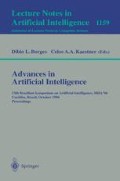Abstract
We present a methodology that enables the use of existent classification inductive learning systems on problems of regression. We achieve this goal by transforming regression problems into classification problems. This is done by transforming the range of continuous goal variable values into a set of intervals that will be used as discrete classes. We provide several methods for discretizing the goal variable values. These methods are based on the idea of performing an iterative search for the set of final discrete classes. The search algorithm is guided by a N-fold cross validation estimation of the prediction error resulting from using a set of discrete classes. We have done extensive empirical evaluation of our discretization methodologies using C4.5 and CN2 on four real world domains. The results of these experiments show the quality of our discretization methods compared to other existing methods.
Our method is independent of the used classification inductive system. The method is easily applicable to other inductive algorithms. This generality turns our method into a powerful tool that extends the applicability of a wide range of existing classification systems.
Preview
Unable to display preview. Download preview PDF.
References
Breiman,L., Friedman,J.H., Olshen,R.A. & Stone,C.J. (1984): Classification and Regression Trees, Wadsworth Int. Group, Belmont, California, USA, 1984.
Clark, P. and Niblett, T. (1988): The CN2 induction algorithm. In Machine Learning, 3, 261–283.
Dillon,W. and Goldstein,M. (1984): Multivariale Analysis. John Wiley & Sons, Inc.
Fayyad, U.M., and Irani, K.B. (1993): Multi-interval Discretization of Continuous-valued Attributes for Classification Learning. In Proceedings of the 13th International Joint Conference on Artificial Intelligence (IJCAI-93). Morgan Kaufmann Publishers.
Friedman, J. (1991): Multivariate Adaptative Regression Splines, In Annals of Statistics, 19:1.
Ginsberg, M. (1993): Essentials of Artificial Intelligence. Morgan Kaufmann Publishers.
Holland, J. (1992): Adaptation in natural and artificial systems: an introductory analysis with applications to biology, control and artificial intelligence. MIT Press.
John,G.H., Kohavi,R. and Pfleger, K. (1994): Irrelevant features and the subset selection problem. In Machine Learning: proceedings of the 11th International Conference. Morgan Kaufmann.
Kohavi, R. (1995): Wrappers for performance enhancement and oblivious decision graphs. PhD Thesis.
Langley, Pr., and Sage, S. (1994): Induction of selective bayesian classifiers. In Proceedings of the 10th conference on Uncertainty in Artificial Intelligence. Morgan Kaufmann Publishers.
Lee, C. and Shin, D. (1994): A context-sensitive Discretization of Numeric Attributes for classification learning. In Proceedings of the 11th European Conference on Artificial Intelligence (ECAI-94), Cohn, A.G. (ed.). John Wiley & Sons.
Michie,D., Spiegelhalter,D.J. & Taylor,C.C. (1994): Machine Learning, Neural and Statistical Classification, Ellis Horwood Series in Artificial Intelligence, 1994.
Mladenic, D. (1995): Automated model selection. In Mlnet workshop on Knowledge Level Modelling and Machine Learning. Heraklion, Crete, Greece.
Pazzani, M.J. (1995): Searching for dependencies in bayesian classifiers. In Proceedings of the 5th international workshop on Artificial Intelligence and Statitics. Ft. Laurderdale, FL.
Quinlan, J. R. (1993): C4.5: programs for machine learning. Morgan Kaufmann Publishers.
Quinlan, J.R. (1992): Learning with Continuos Classes. In Proceedings of the 5th Australian Joint Conference on Artificial Intelligence. Singapore: World Scientific, 1992.
Torgo, L. (1995): Data Fitting with Rule-based Regression. In Proceedings of the 2nd international workshop on Artificial Intelligence Techniques (AIT95), Zizka,J. and Brazdil,P. (eds.). Brno, Czech Republic.
van Laarhoven,P. and Aarts,E. (1987): Simulated annealing: Theory and Applications. Kluwer Academic Publishers.
Weiss, S. and Indurkhya, N. (1993): Rule-base Regression. In Proceedings of the 13th International Joint Conference on Artificial Intelligence, pp. 1072–1078.
Weiss, S. and Indurkhya, N. (1995): Rule-based Machine Learning Methods for Functional Prediction. In Journal Of Artificial Intelligence Research (JAIR), volume 3, pp.383–403.
Author information
Authors and Affiliations
Editor information
Rights and permissions
Copyright information
© 1996 Springer-Verlag Berlin Heidelberg
About this paper
Cite this paper
Torgo, L., Gama, J. (1996). Regression by classification. In: Borges, D.L., Kaestner, C.A.A. (eds) Advances in Artificial Intelligence. SBIA 1996. Lecture Notes in Computer Science, vol 1159. Springer, Berlin, Heidelberg. https://doi.org/10.1007/3-540-61859-7_6
Download citation
DOI: https://doi.org/10.1007/3-540-61859-7_6
Published:
Publisher Name: Springer, Berlin, Heidelberg
Print ISBN: 978-3-540-61859-1
Online ISBN: 978-3-540-70742-4
eBook Packages: Springer Book Archive

